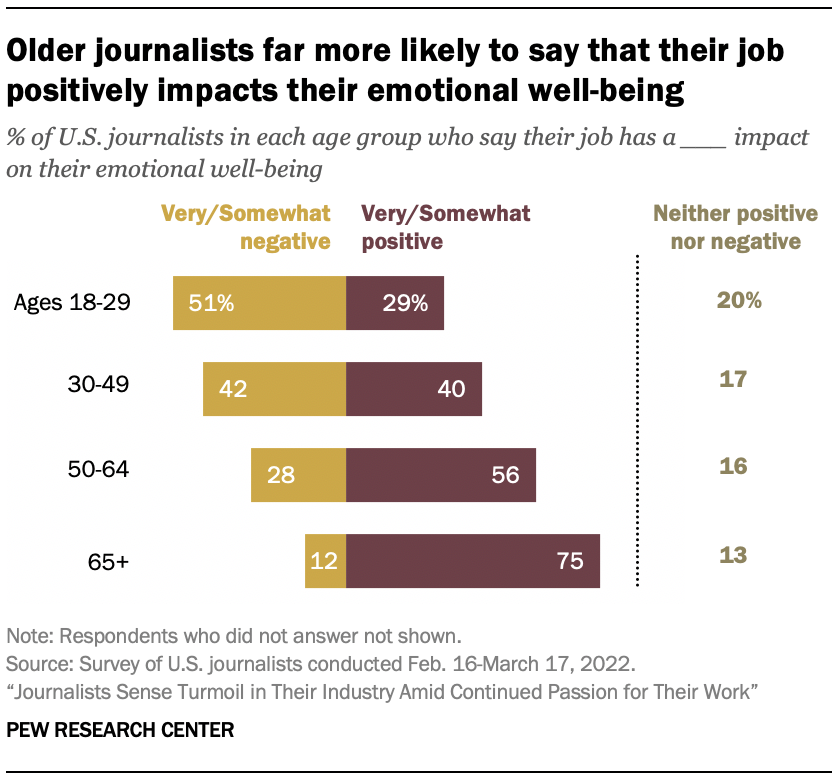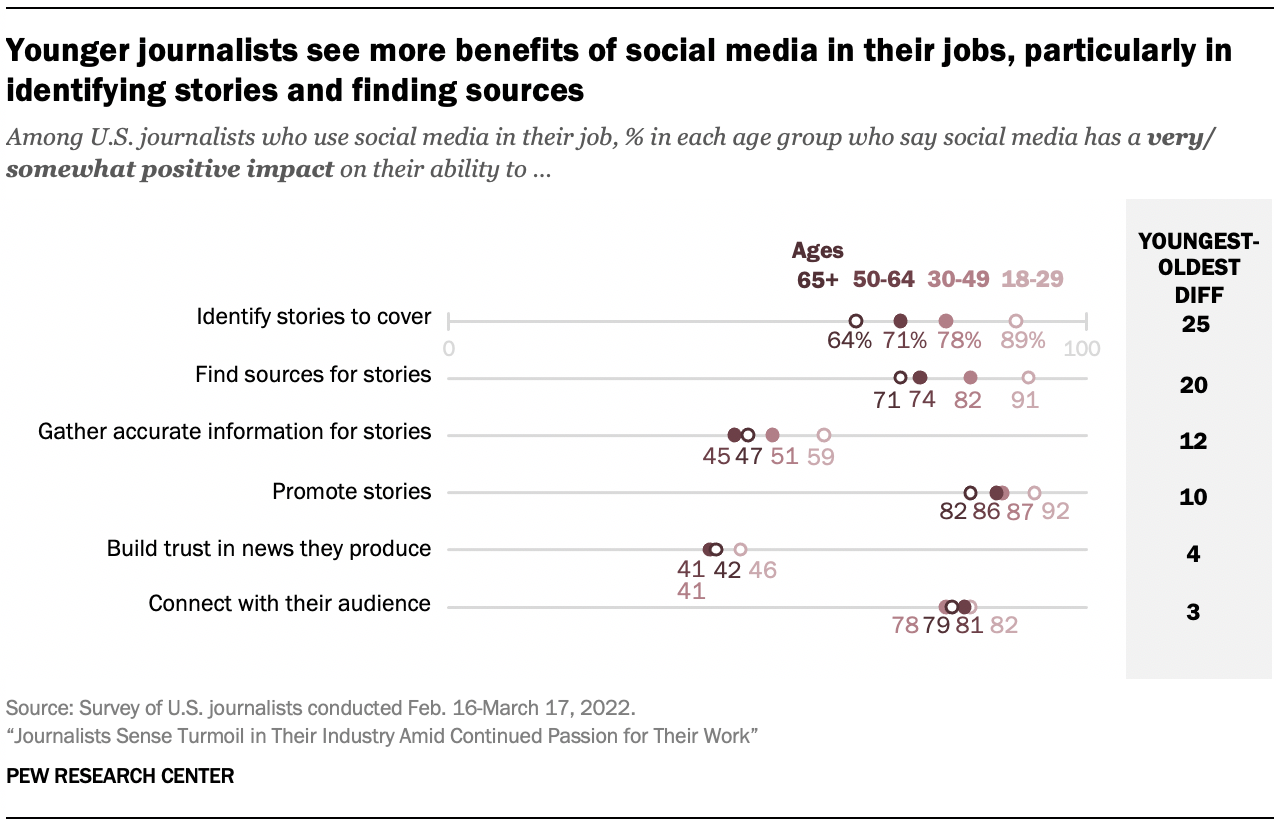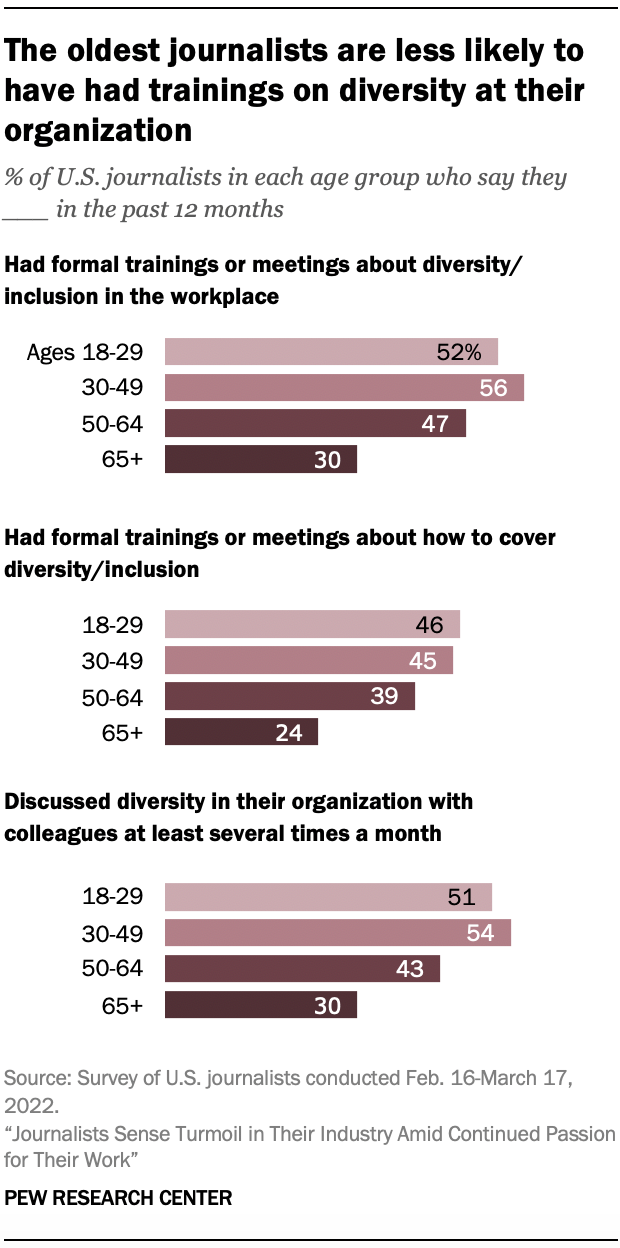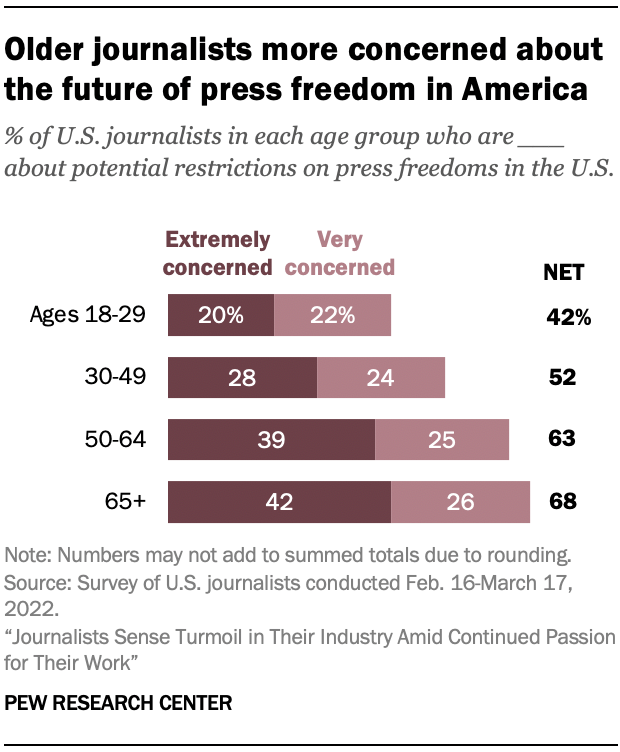In many cases, journalists’ views on the topics addressed in this survey vary by age, with the starkest differences frequently showing up between the youngest and oldest groups of the journalists surveyed. (See Appendix for a detailed breakdown of the sample by age.)

One of the largest gaps between age groups emerges around the question of what impact respondents’ jobs have on their emotional well-being. Three-quarters of journalists ages 65 and older say their job has a very or somewhat positive impact on their emotional well-being. But among journalists ages 18 to 29, that number plummets to about three-in-ten (29%). Instead, roughly half of all journalists under 30 (51%) say their job has a negative effect on their emotional well-being.1
In a related area, journalists 65 and older are less likely to report having experienced at least one incident of job-related threat or harassment from someone outside their news organization in the past year (30%). That percentage increases to about half among those ages 18 to 29 (50%) and 30 to 49 (48%).
Among journalists who report experiencing some kind of harassment from someone outside their organization, younger journalists are more likely to have experienced at least some of it through social media: 82% of journalists under 30 say at least one of the incidents of harassment they experienced in the past year was on social media, versus 66% of those 65 and older.
Overall, journalists of all age groups are far more likely to say social media’s impact on the state of journalism in the U.S. has been negative rather than positive. But younger journalists stand out from their elders in their assessments of how social media can aid in a number of specific tasks related to their jobs.
Among journalists who use social media for their job, 89% of those ages 18 to 29 say social media has a very or somewhat positive impact on their ability to identify stories that should be covered, 25 percentage points higher than those 65 and older (64%). A similar percentage of the youngest journalists (91%) say social media has a positive impact on finding sources for stories, again higher than the oldest group (71%).

Younger journalists less satisfied with their organization’s diversity efforts

There also are noteworthy gaps between journalists of different age groups on issues related to newsroom diversity and inclusion. In many areas, younger journalists are more likely than their older peers to say their organization (or the main one they work for if they work for more than one) does not have sufficient diversity, including racial and ethnic diversity, with 68% of journalists ages 18 to 29 saying there is not enough diversity in this area at their organization, compared with 37% of those 65 and older. Another large gap exists on the issue of socioeconomic diversity: 44% of those ages 18 to 29 say their organization does not have enough diversity in this area, compared with 22% of those 65 and older.
Overall, a majority of the journalists surveyed in each age group say everyone in their organization is treated fairly, regardless of race and ethnicity, but younger journalists are somewhat less likely to do so: About six-in-ten journalists ages 18 to 29 (61%) and 30 to 49 (62%) say this, compared with 72% of journalists ages 50 to 64 and 75% of those 65 and older.
The oldest group of journalists is also considerably less likely to have trainings or discussions about diversity and inclusion. For instance, while 45% of journalists under 50 say they have attended a formal training or meeting on how to cover issues of diversity in the news in the past year, about a quarter of journalists 65 and older (24%) have done so.
Oldest journalists most concerned about possible press restrictions, but also most satisfied in their jobs

One issue that concerns older journalists more than younger ones is the prospect of restrictions being imposed on the profession. Roughly two-thirds of journalists ages 65 and older (68%) and those 50 to 64 (63%) say they are extremely or very concerned about potential restrictions on press freedoms in America. Smaller yet sizable percentages of journalists under 30 (42%) and ages 30 to 49 (52%) share these concerns.
Older journalists appear to be satisfied with their work somewhat more than the rest of their colleagues. Though majorities of each age group express high levels of satisfaction, those 65 and older outpace other age groups in the share who are very or somewhat satisfied with their job.2 And about four-in-five journalists in this age range (83%) say they are very or extremely proud of the work they produce, compared with 68% of journalists ages 18 to 29.
In another measure related to job satisfaction, journalists 65 and older feel the most connected to their audiences. About two-thirds (66%) say they feel extremely or very connected, far more than the share of those ages 18 to 29 (29%) and 30 to 49 (37%) who say the same.


 What do journalists think the news industry does best and worst?
What do journalists think the news industry does best and worst?